Charles E W Bean, Diaries, AWM38 3DRL 606/256/1 - 1915 - 1936 - Part 15
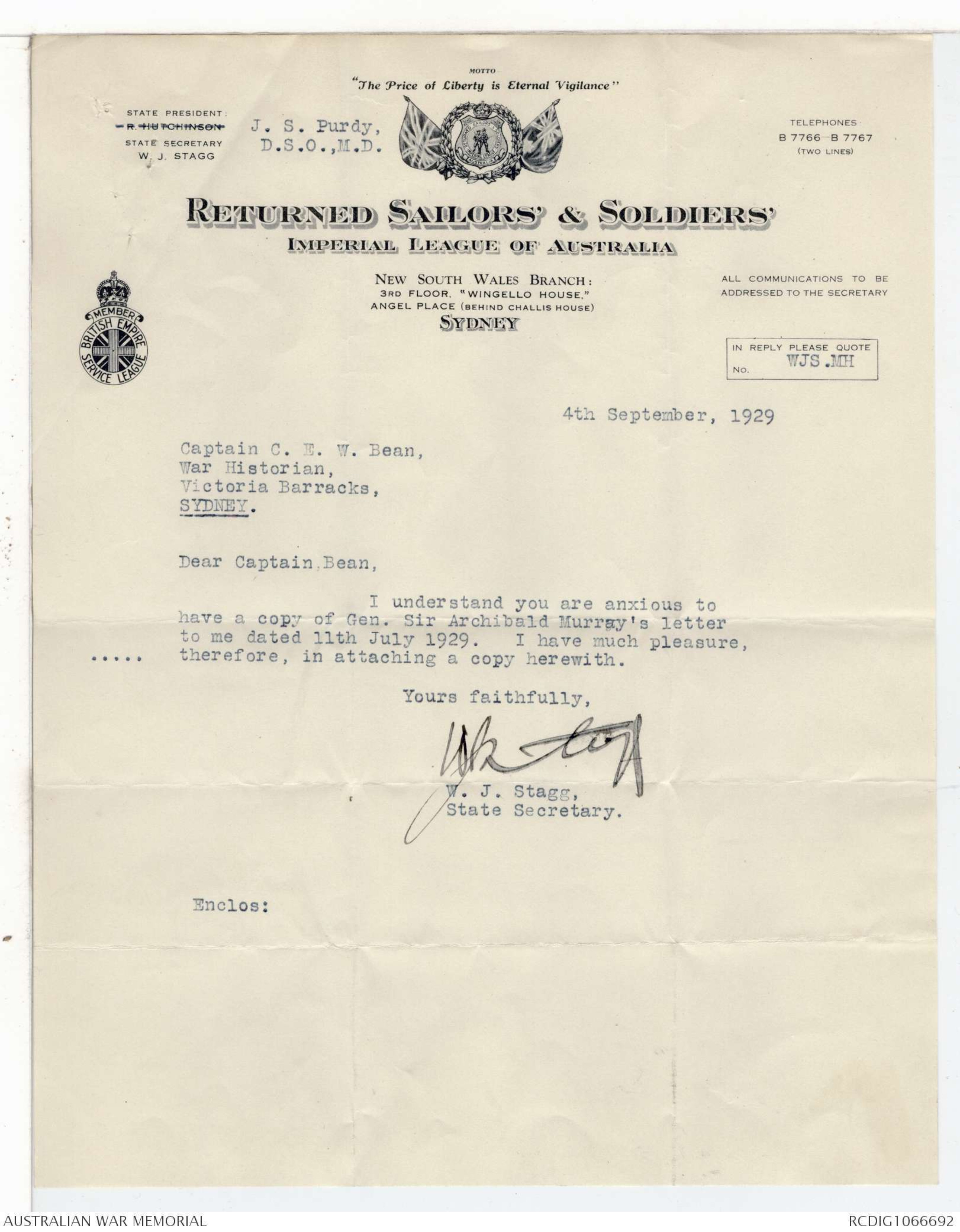
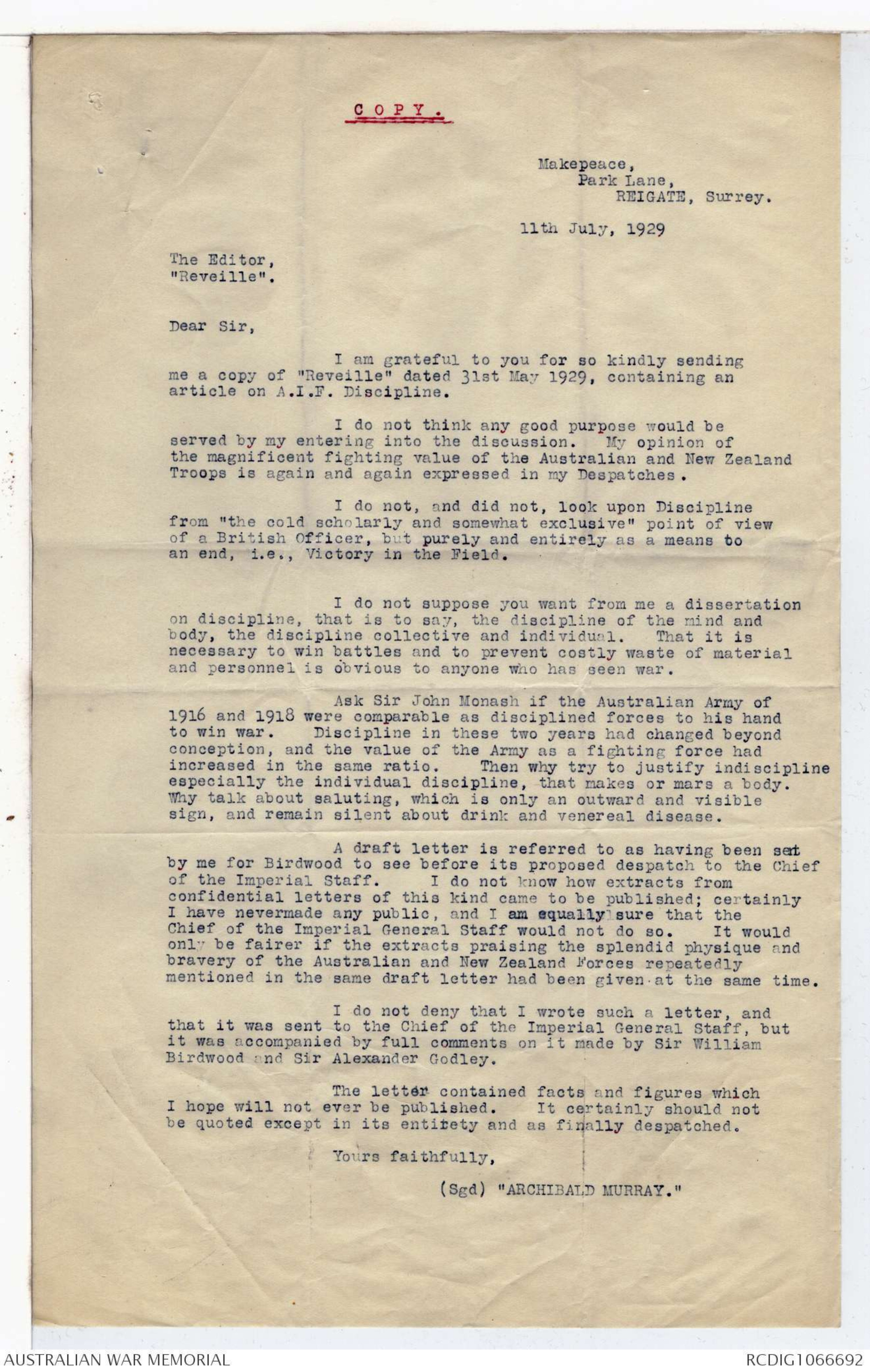
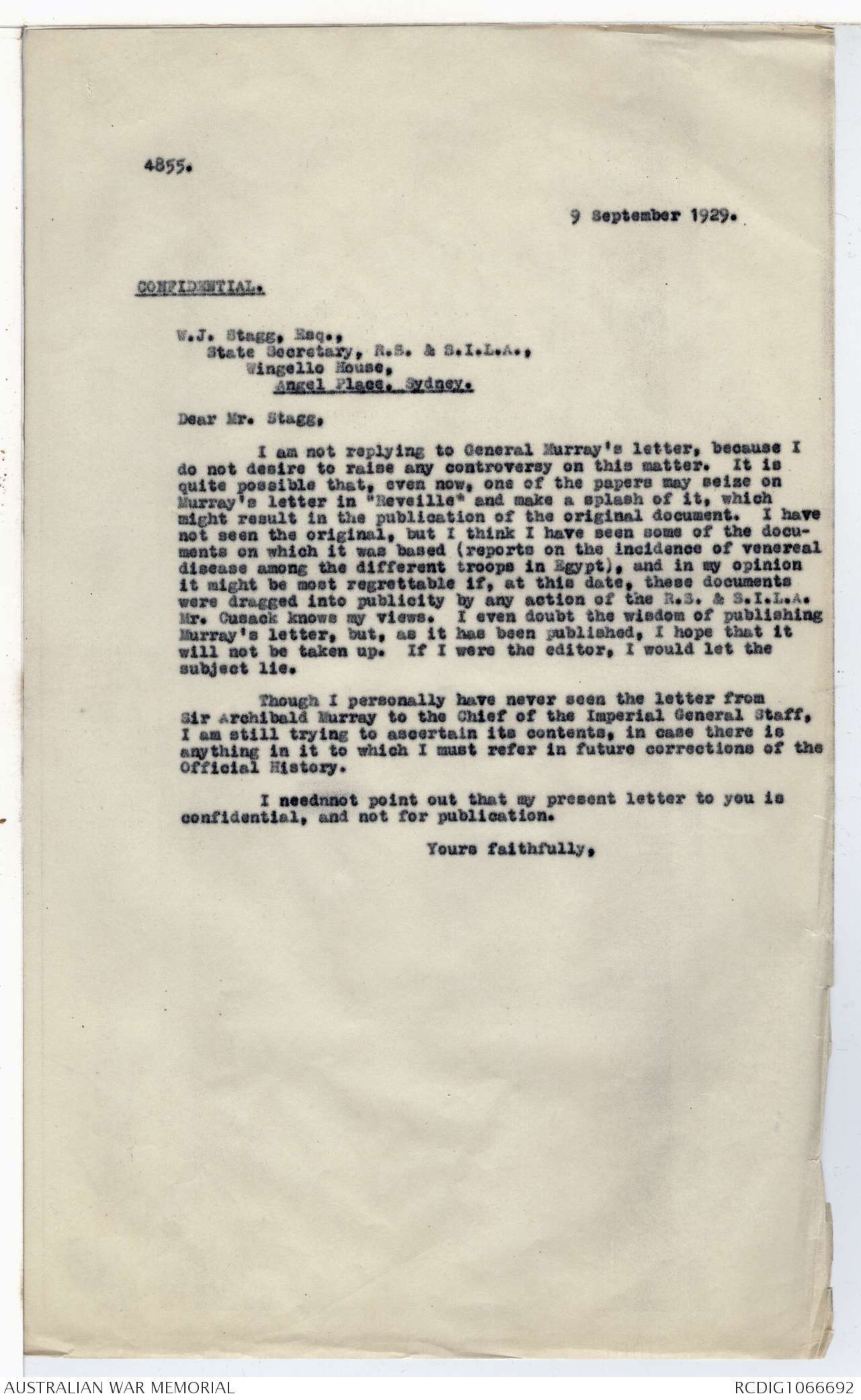
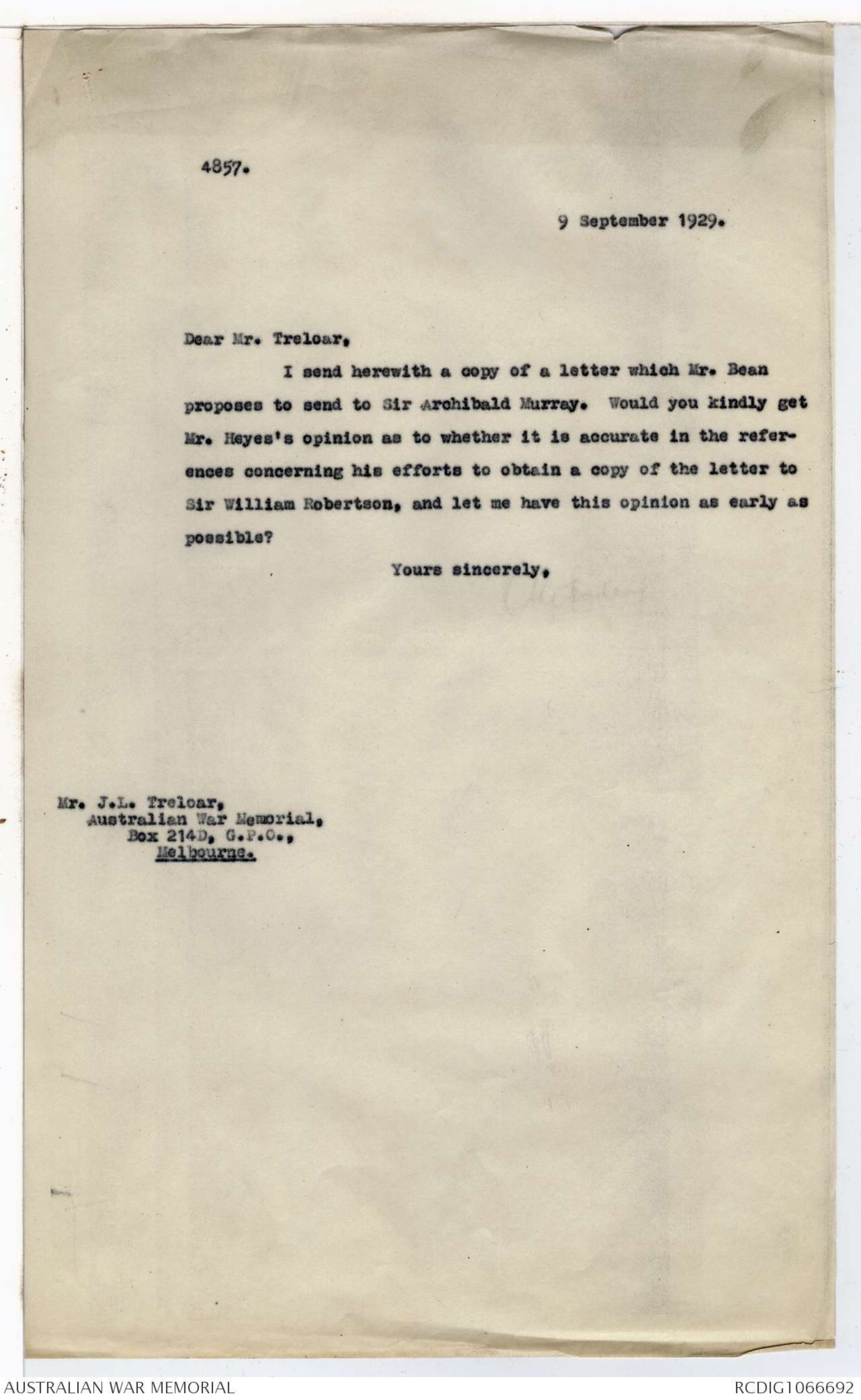
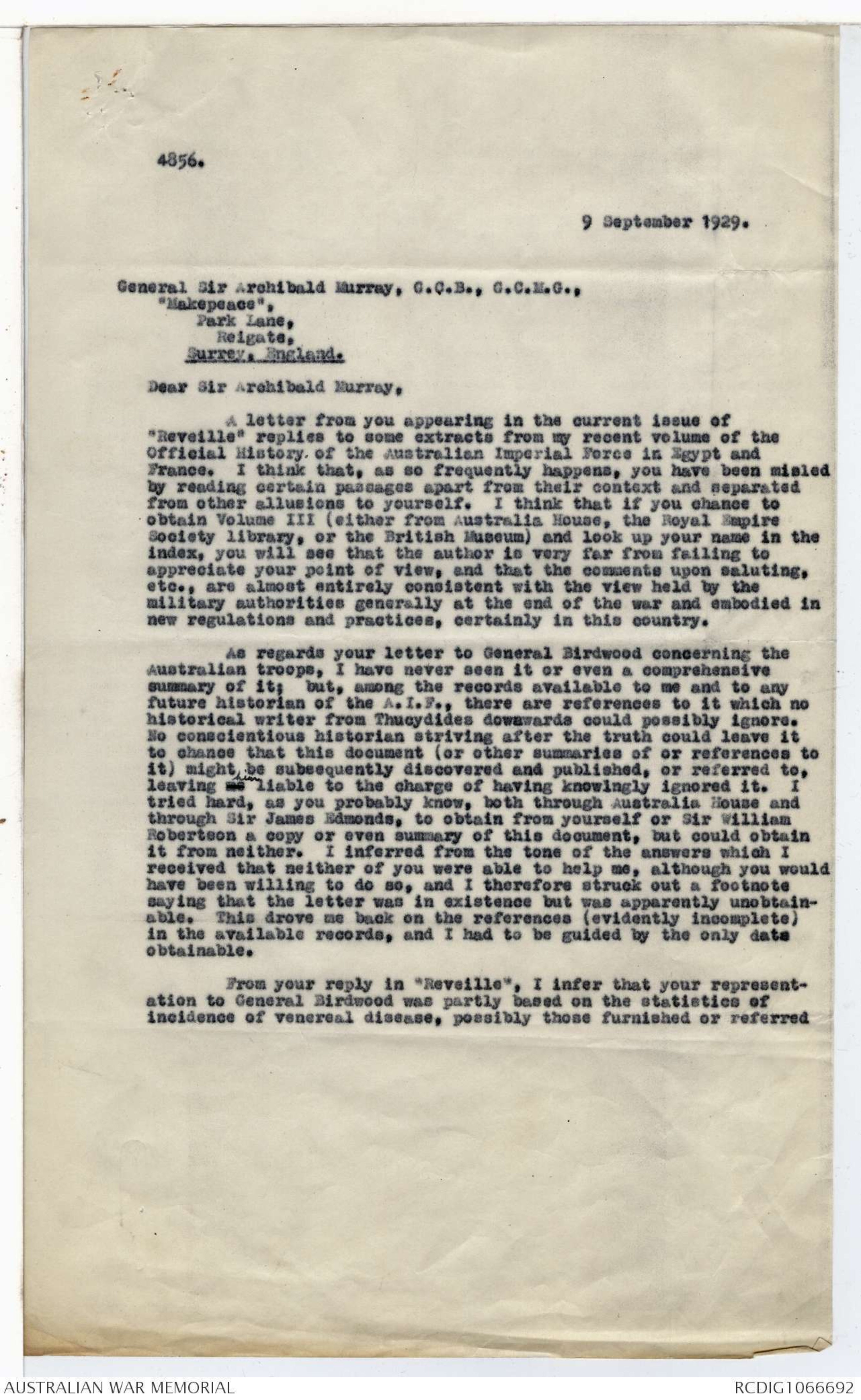
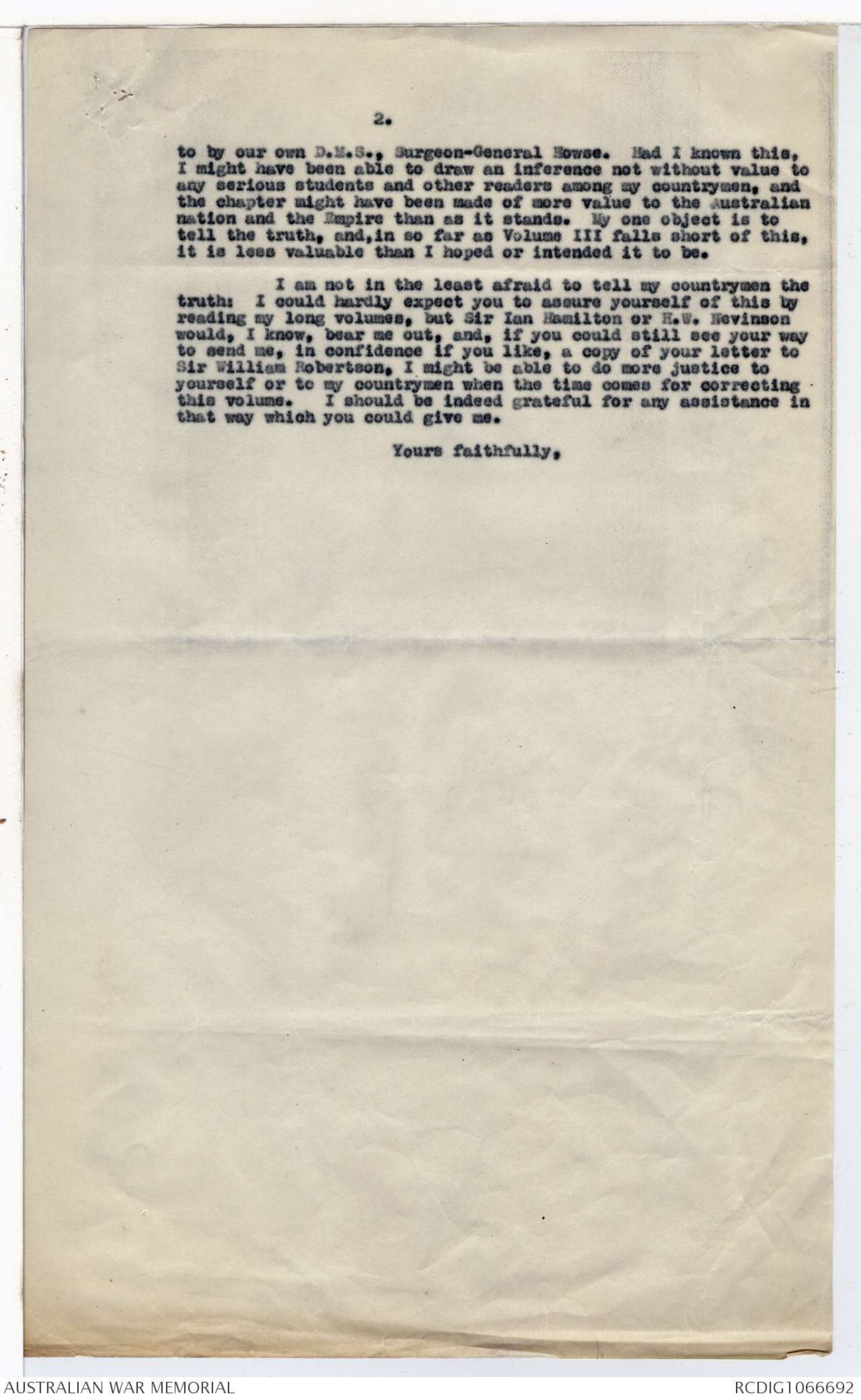
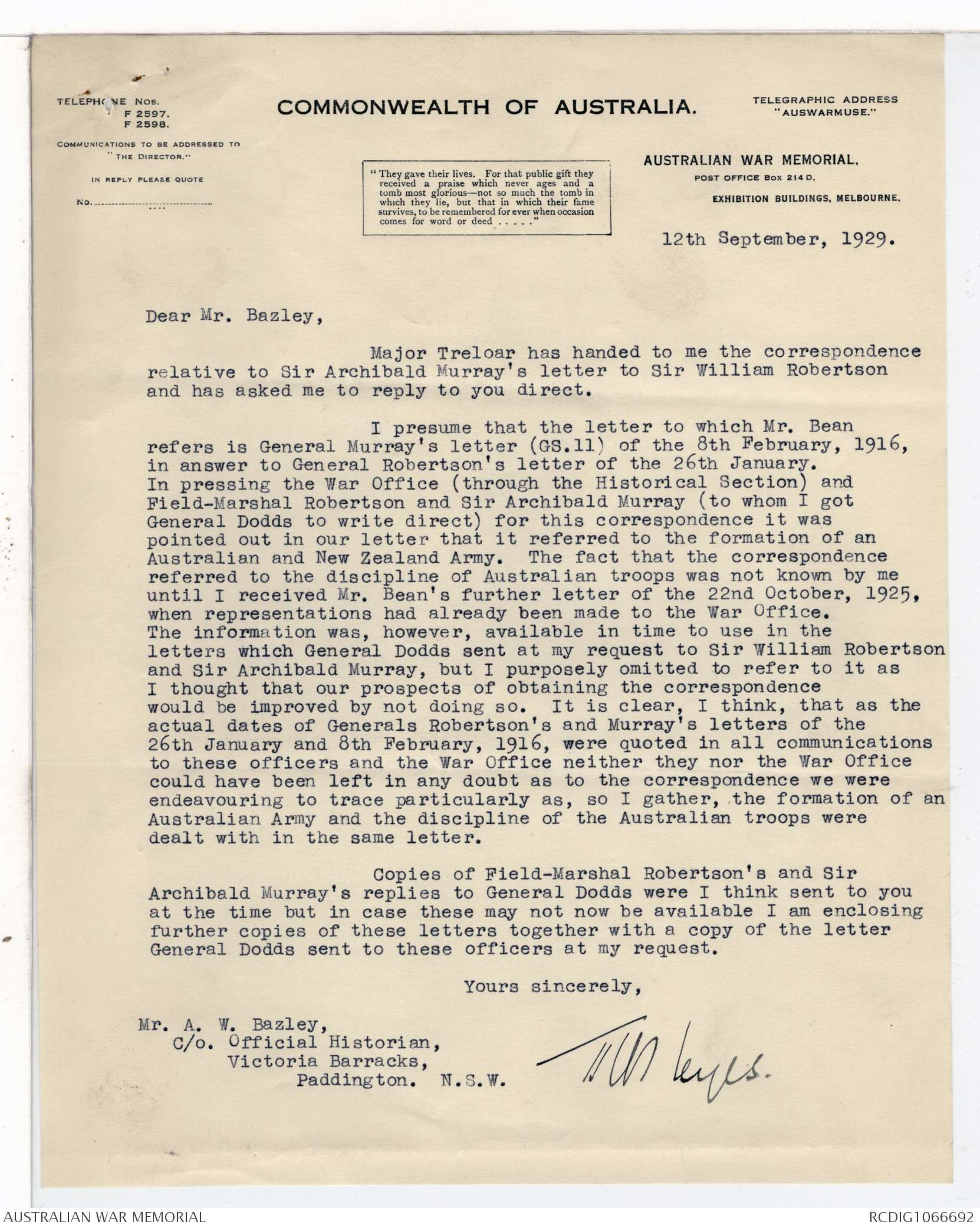
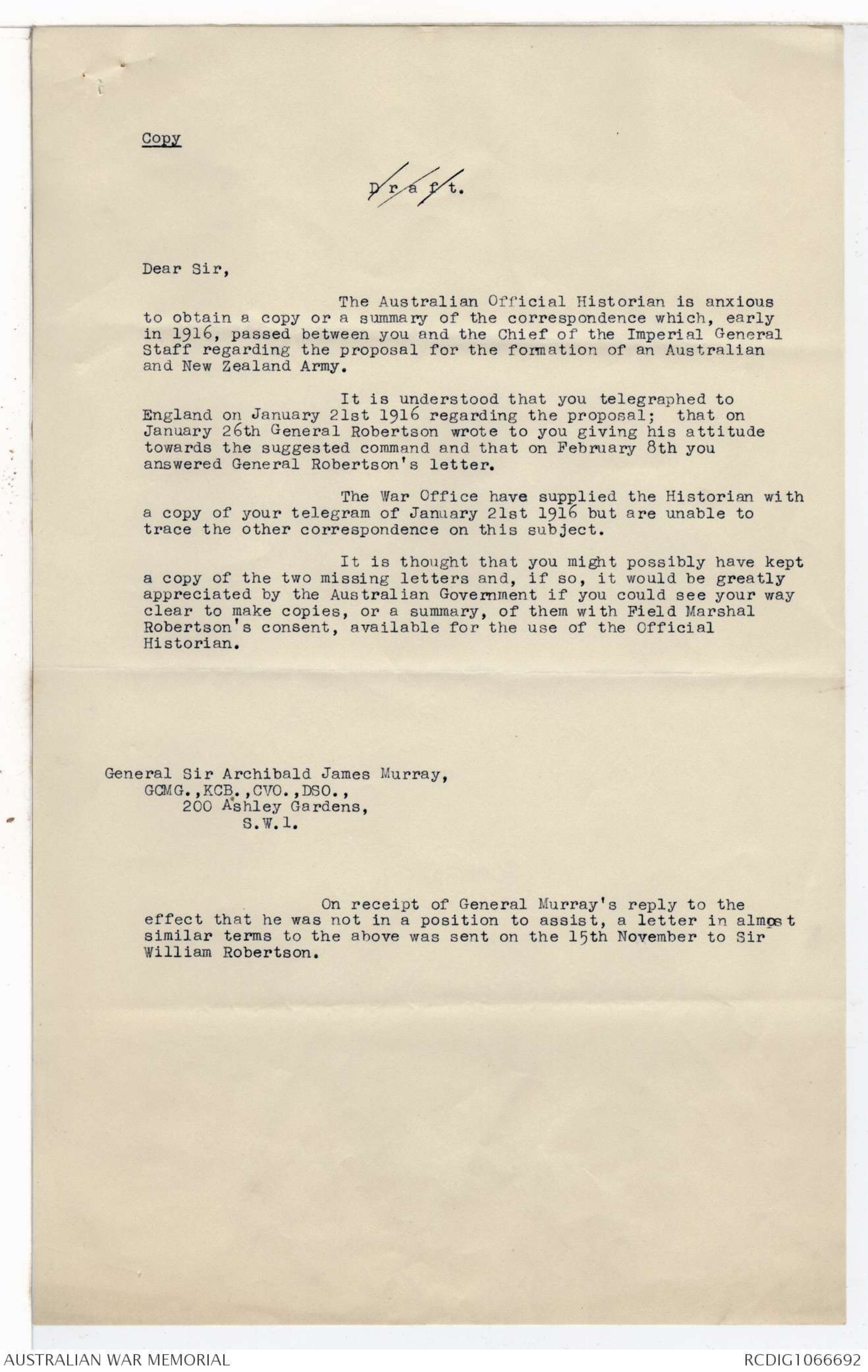
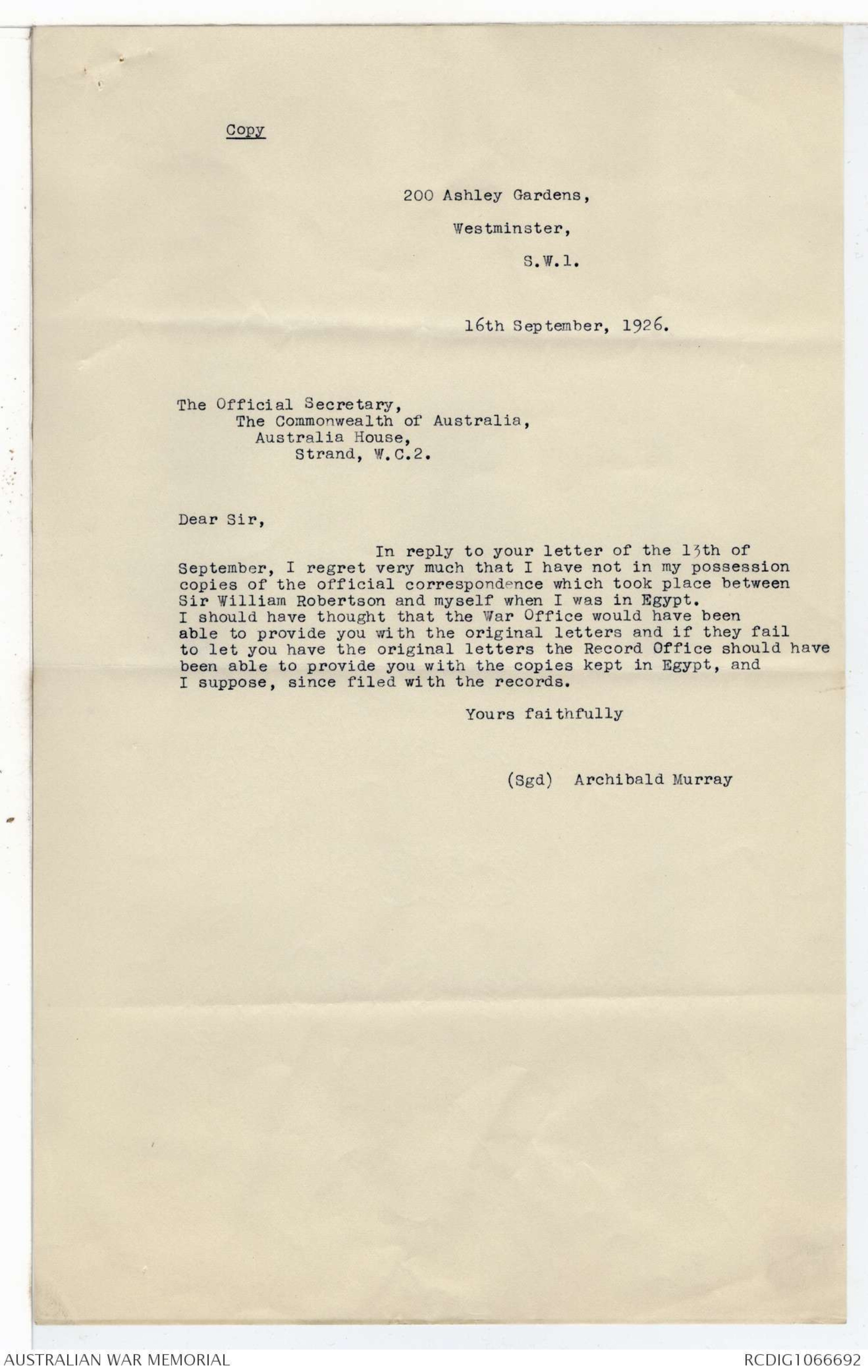
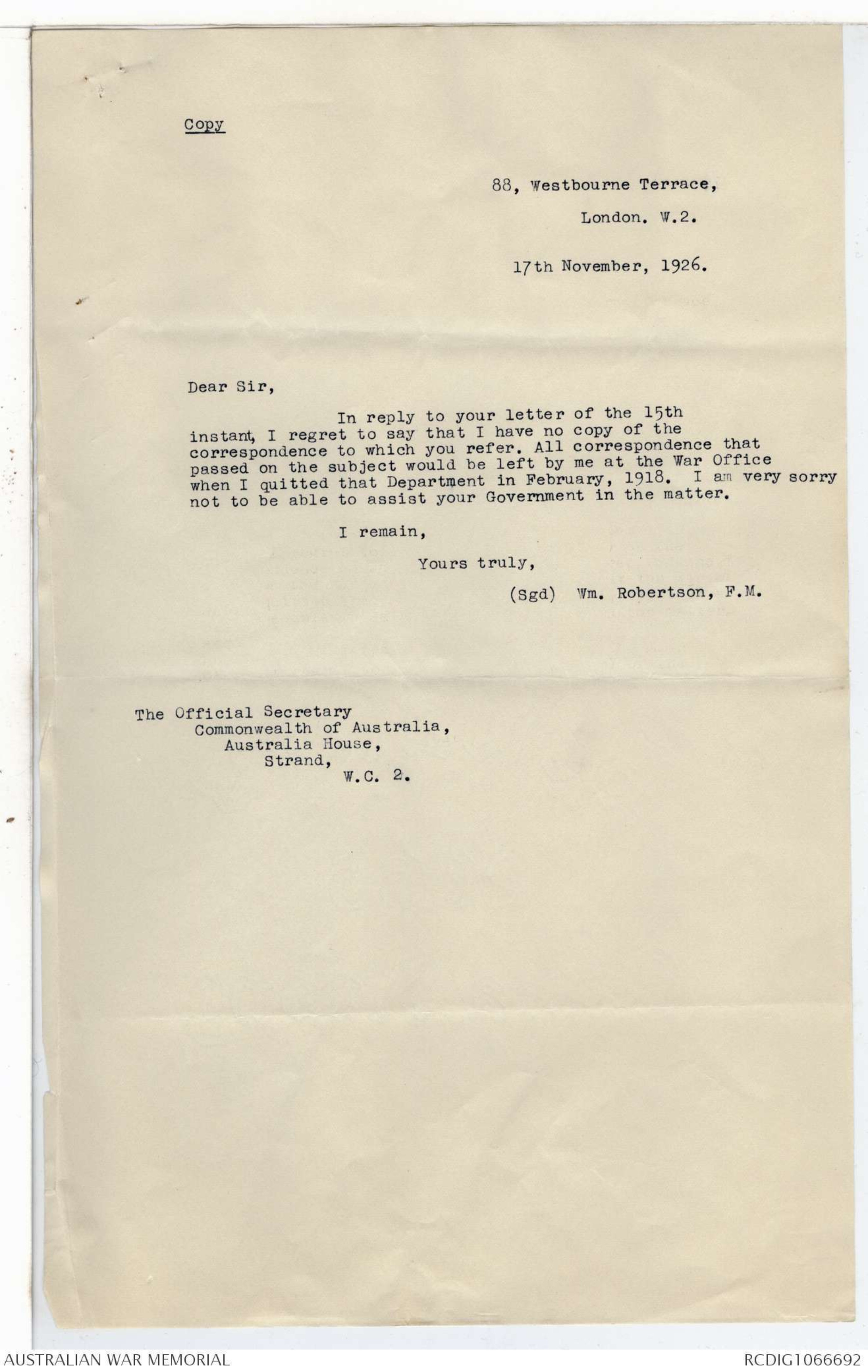
Motto
”The Price of Liberty is Eternal Vigilance”
STATE PRESIDENT. TelephonesR. HUTCHINSON 8 7766 - 87767
J. S. Purdy. (Two Lines)
D.S.O., M.D.
STATE SECRETARY
W.J.STAGG
RETURNED SAILORS & SOLDIERS
IMPERIAL LEAGUE OF AUSTRALIA
NEW SOUTH WALES BRANCH:
3RD FLOOR “WINGELLO HOUSE”.
ANGEL PLACE (BEHIND CHALLIS HOUSE)
SYDNEY
ALL COMMUNICATIONS TO BE
ADDRESSED TO THE SECRETARY
IN REPLY PLEASE QUOTE
No. WJS.MH
4th September, 1929
Captain C. E. W. Bean,
War Historian
Victoria Barracks,
SYDNEY
Dear Captain, Bean,
I understand you are anxious to
have a copy of Gen. Sir Archibald Murray's letter
to me dated 11th July 1929. I have much pleasure,
therefore, in attaching a copy herewith.
Yours faithfully,
W.J.STAGG,
State Secretary.
Enclos:
COPY
Makepeace,
Park Lane
REIGATE, Surrey.
11th July, 1929
The Editor
"Reveille".
Dear Sir,
I am grateful to you for so kindly sending
me a copy of "Reveille" dated 31st May 1929, containing an
article on A.I.F. Discipline.
I do not think any good purpose would be
served by my entering into the discussion.
My opinion of
the magnificent fighting value of the Australian and New Zealand
Troops is again and again expressed in my Despatches.
I do not, and did not, look upon Discipline
from "the cold scholarly and somewhat exclusive" point of view
of a British Officer, but purely and entirely as a means to
an end, i.e., Victory in the Field.
I do not suppose you want from me a dissertation
on discipline,
that is to say, the discipline of the mind and
That it is
body, the discipline collective and individual.
necessary to win battles and to prevent costly waste of material
and personnel is obvious to anyone who has seen war.
Ask Sir John Monash if the Australian Army of
1916 and 1918 were comparable as disciplined forces to his hand
to win war.
Discipline in these two years had changed beyond
conception, and the value of the Army as a fighting force had
increased in the same ratio.
Then why try to justify indiscipline
especially the individual discipline, that makes or mars a body.
Why talk about saluting, which is only an outward and visible
sign, and remain silent about drink and venereal disease.
A draft letter is referred to as having been set
by me for Birdwood to see before its proposed despatch to the Chief
of the Imperial Staff.
I do not know how extracts from
confidential letters of this kind came to be published; certainly
I have nevermade any public, and I am equallylsure that the
Chief of the Imperial General Staff would not do so.
It would
only be fairer if the extracts praising the splendid physique and
bravery of the Australian and New Zealand Forces repeatedly
mentioned in the same draft letter had been given at the same time.
I do not deny that I wrote such a letter, and
that it was sent to the Chief of the Imperial General Staff, but
it was accompanied by full comments on it made by Sir William
Birdwood and Sir Alexander Godley.
The letter contained facts and figures which
I hope will not ever be published.
It certainly should not
be quoted except in its entirety and as finally despatched.
Yours faithfully,
(Sgd) "ARCHIBALD MURRAY."
4855.
9 September 1929.
CONFIDENTIAL
W.J. Stagg. Esq.,
State Sccretary, R.S. & S.I.L.A.,
Wingello House,
Angel Place. Sydney.
Dear Mr. Stagg.
I am not replying to General Murray’s letter, because I
do not desire to raise any controversy on this matter. It is
quite possible that, even now, one of the papers may seize on
Murray's letter in "Reveille" and make a splash of it, which
might result in the publication of the original document. I have
not seen the original, but I think I have seen some of the documents on which it was based (reports on the incidence of venereal
disease among the different troops in Egypt). and in my opinion
it might be most regrettable if, at this date, these documents
were dragged into publicity by any action of the R.S. & S.I.L.A.
Mr. Cusack knows my views. I even doubt the wisdom of publishing
Murray’s letter, but, as it has been published, I hope that it
will not be taken up. If I were the editor, I would let the
subject lie.
Though I personally have never seen the letter from
Sir Archibald Murray to the Chief of the Imperial Ceneral Staff,
I am still trying to ascertain its contents, in case there is
anything in it to which I must refer in future corrections of the
Official History.
( I need not point out that my present letter to you is
confidential, and not for publication.)
Yours faithfully,
4857.
9 September 1929.
Dear Mr. Treloar,
I send herewith a copy of a letter which Mr. Bean
proposes to send to Sir Archibald Murray. Would you kindly get
Mr. Haye’s opinion as to whether it is accurate in the
references concerning his efforts to obtain a copy of the letter to
Sir William Robertson, and let me have this opinion as early as
possible?
Yours sincerely,
Mr. J.L. Treloar
Australian War Memorial
Box 214D, G.P.O
Melbourne
4856.
9 September 1929.
Ceneral Sir Archibald Murray. C.C.B., G.C.M.G
”Makepeace”,
Park Lane,
Reigate,
Surrey, England
Dear Sir Archibald Murray
A letter from you appearing in the current issue of “Reveille" replies to some extracts from my recent volume of the
Official History of the Australian Imperial Forcs in Egypt and
France. I think that, as so frequently happens, you have been misled
by reading certain passages apart from their context and separated
from other allusions to yourself. I think that if you chance to
obtain Volume III (either from Australia House the Royal Empire
Society library, or the British Museum) and look up your name in the
index, you will see that the author is very far from failing to
appreciate your point of view, and that the comments upon saluting,
etc.. are almost entirely consistent with the view held by the
military authorities generally at the end of the war and embodied in
new regulations and practices, certainly in this country.
As regards your letter to Ceneral Birdwood concerning the
Australian troops, I have never seen it or even a comprehensive
summary of it; but, among the records available to me and to any
future historian of the A.I.F., there are references to it which no
historical writer from Thucydides downwards could possibly ignore.
No conscientious historian striving after the truth could leave it
to chance that this document (or other summaries of or references to
be subsequently discovered and published, or referred to,
by chance
leaving liable to the charge of having knowingly ignored it.
I tried hard, as you probably know, both through Australia House and
through Sir James Edmonds, to obtain from yourself or Sir William
Robertson a copy or even summary of this document, but could obtain
it from neither. I inferred from the tone of the answers which I
received that neither of you were able to help me, although you would
have been willing to do so, and I therefore struck out a footnote
saying that the letter was in existence but was apparently unobtainable.
This drove me back on the references (evidently incomplete)
in the available records, and I had to be guided by the only data
obtainable.
From your reply in "Reveille', I infer that your
representation to Ceneral Birdwood was partly based on the statistics of
incidence of venereal disease, possibly those furnished or referred
2.
to by our own D.M.S., Surgeon-General Hosse. Mad I known this,
I might have been able to draw an inference not without value to
any serious students and other readers among sy countrymen, and
the chapter might have been made of more value to the Australian
nation and the Empire than as it stands. My one object is to
tell the truth, and, in so far as Volume III falls short of this,
it is less valuable than I hoped or intended it to be.
I am not in the least afraid to tell my countrymen the
truth: I could hardly expect you to assure yourself of this by
reading my long volumes, but Sir Ian Hamilton or H.W. Nevinson
would, I know, bear me out, and, if you could still see your way
to send me, in confidence if you like, a copy of your letter to
Sir William Robertson, I might be able to do more justice to
yourself or to my countrymen when the time comes for correcting
this volume. I should be indeed grateful for any assistance in
that way which you could give me.
Yours faithfully,
12th September, 1929.
Dear Mr. Bazley,
Major Treloar has handed to me the correspondence
relative to Sir Archibald Murray's letter to Sir William Robertson
and has asked me to reply to you direct.
I presume that the letter to which Mr. Bean
refers is General Murray's letter (GS.11) of the 8th February, 1916,
in answer to General Robertson's letter of the 26th January.
In pressing the War Office (through the Historical Section) and
Field-Marshal Robertson and Sir Archibald Murray (to whom I got
General Dodds to write direct) for this correspondence it was
pointed out in our letter that it referred to the formation of an
Australian and New Zealand Army. The fact that the correspondence
referred to the discipline of Australian troops was not known by me
until I received Mr. Bean's further letter of the 22nd October, 1925,
when representations had already been made to the War Office.
The information was, however, available in time to use in the
letters which General Dodds sent at my request to Sir William Robertson
and Sir Archibald Murray, but I purposely omitted to refer to it as
I thought that our prospects of obtaining the correspondence
would be improved by not doing so. It is clear, I think, that as the
actual dates of Generals Robertson's and Murray's letters of the
26th January and 8th February, 1916, were quoted in all communications
to these officers and the War Office neither they nor the War Office
could have been left in any doubt as to the correspondence we were
endeavouring to trace particularly as, so I gather, the formation of an
Australian Army and the discipline of the Australian troops were
dealt with in the same letter.
Copies of Field-Marshal Robertson's and Sir
Archibald Murray's replies to General Dodds were I think sent to you
at the time but in case these may not now be available I am enclosing
further copies of these letters together with a copy of the letter
General Dodds sent to these officers at my request.
Yours sincerely,
Mr. A. W. Bazley
C/o. Official Historian,
Victoria Barracks,
Paddington. N.S.W.
CopyDraft
Dear Sir,
The Australian Official Historian is anxious
to obtain a copy or a summary of the correspondence which, early
in 1916, passed between you and the Chief of the Imperial General
Staff regarding the proposal for the formation of an Australian
and New Zealand Army.
It is understood that you telegraphed to
England on January 21st 1916 regarding the proposal;
that on
January 26th General Robertson wrote to you giving his attitude
towards the suggested command and that on February 8th you
answered General Robertson's letter.
The War Office have supplied the Historian with
a copy of your telegram of January 21st 1916 but are unable to
trace the other correspondence on this subject.
It is thought that you might possibly have kept
a copy of the two missing letters and, if so, it would be greatly
appreciated by the Australian Government if you could see your way
clear to make copies, or a summary, of them with Field Marshal
Robertson s consent, available for the use of the Official
Historian.
General Sir Archibald James Murray,
GCMG., KCB.,CVO.,DSO.,
200 Ashley Gardens,
S.W.1.
On receipt of General Murray's reply to the
effect that he was not in a position to assist, a letter in almost
similar terms to the above was sent on the 15th November to Sir
William Robertson.
COPY
200 Ashley Gardens,
Westminster,
S.W.1.
16th September, 1926.
The Official Secretary
The Commonwealth of Australia,
Australia House
Strand, W.C.2.
Dear Sir,
In reply to your letter of the 13th of
September, I regret very much that I have not in my possession
copies of the official correspondence which took place between
Sir William Robertson and myself when I was in Egypt.
I should have thought that the War Office would have been
able to provide you with the original letters and if they fail
to let you have the original letters the Record Office should have
been able to provide you with the copies kept in Egypt, and
I suppose, since filed with the records.
Yours faithfully
(Sgd) Archibald Murray
Copy
88, Westbourne Terrace,
London. W.2.
17th November, 1926.
Dear Sir,
In reply to your letter of the 15th
instant I regret to say that I have no copy of the
correspondence to which you refer. All correspondence that
passed on the subject would be left by me at the War Office
when I quitted that Department in February, 1918. I am very sorry
not to be able to assist your Government in the matter.
I remain,
Yours truly,
(Sgd) Wm. Robertson, F.M.
The Official Secretary
Commonwealth of Australia,
Australia House
Strand,
W.C. 2.
 Sam scott
Sam scottThis transcription item is now locked to you for editing. To release the lock either Save your changes or Cancel.
This lock will be automatically released after 60 minutes of inactivity.